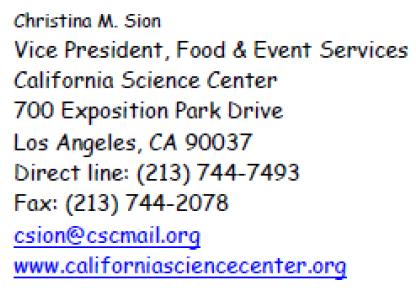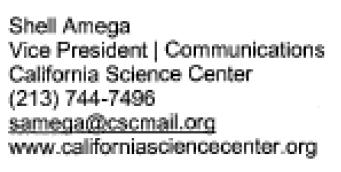 Free Speech
Free Speech
Intelligent Design Discrimination Lawsuit Wasn’t the First Time California Science Center Paid Money to Avoid a Trial over Misconduct
We’ve devoted considerable commentary here to the recent settlement of an intelligent design (ID) discrimination lawsuit against the state-run California Science Center (CSC). However, it’s worth bearing in mind that this was not the first court case arising from CSC’s misconduct that ended up settling. Last year, the CSC settled a separate (though related) lawsuit filed by Discovery Institute. That was after CSC violated California’s Public Records Act in refusing to turn over e-mails we requested. In the terms of the settlement, CSC turned over the e-mails we had originally requested and paid our attorneys’ fees and court costs.
After CSC cancelled the event sponsored by American Freedom Alliance (AFA) in 2009, Discovery Institute immediately filed a request under California’s Public Records Act (CPRA) requesting public documents held by CSC shedding light on why the museum cancelled AFA’s event. After sending us a thin stack of documents, the CSC claimed that it had turned over all the documents we requested. We suspected they hadn’t disclosed all of the documents as required by law. When we discovered CSC had in fact withheld certain relevant e-mails that we knew existed, Discovery Institute was forced to file suit to compel the CSC to obey the law and comply with the CPRA.
In one response to our lawsuit’s arguments, CSC made the incredible claim that its key decision-makers, clearly identified as CSC staff on the museum’s website, were employed not by the museum but by a private CSC “Foundation,” and were thus immune from public records requests. This seemed like another attempt to avoid public accountability for having cancelled AFA’s event.
For example, CSC claimed it didn’t have to turn over communications from its Vice President of Food and Event Services, Christina Sion, because she was merely a “Foundation employe[e].” Yet she is advertised on CSC’s website as “Vice President, Food & Event Services, California Science Center.” For example, see this online flyer from CSC which calls her “California Science Center Vice President of Event Services, Chris Sion.” This also is seen in the signature found in many of Chris Sion’s e-mails:

Sion apparently did not advertise herself as working for the “Foundation” — she’s listed as a vice president of the California Science Center itself.
Likewise, CSC claimed that Shell Amega is exempt from CPRA requests, but Amega is represented as “Vice President Communications, California Science Center,” as seen in the scan of her signature below:

And when we browse the California Science Center’s website, we find it’s full of pages that list Amega as the media contact for the “California Science Center” — with no mention of her working for or representing the “Foundation.” For just a few of many examples that list Amega as working for the “California Science Center,” see:
- CALIFORNIA SCIENCE CENTER TO HOST WEST COAST DEBUT OF AMERICA I AM: THE AFRICAN AMERICAN IMPRINT EXHIBITION
- BODY WORLDS 2’s Final Farewell to Los Angeles
In these (and many other) examples, the California Science Center lists Shell Amega as a high-level media contact for the “California Science Center.” Yet when asked to provide public records pertaining to her actions at the publicly operated museum, CSC conveniently claimed Amega doesn’t work for the “California Science Center,” but rather for the “Foundation.” These sorts of bogus arguments amount to shell game, of course, showing the lengths to which CSC is willing to go to avoid public accountability.
In response to our prior lawsuit, CSC offered even less credible reasons for refusing to disclose all public documents from California Science Center’s President and CEO Jeff Rudolph. CSC’s lawyers asserted that Mr. Rudolph is “employed by both the Center and Foundation” and thus, allegedly, “The Center produced Mr. Rudolph’s correspondence responsive to the Request in his capacity as a Center employee … but did not produce any documents that the Foundation may have involving Mr. Rudolph in his capacity as a Foundation employee.”
While it’s true that Jeff Rudolph works for both the Science Center and the “Foundation,” CSC offered no principled reasons to explain their apparently arbitrary determinations as to why some e-mails from Rudolph were generated “in his capacity as a Center employee,” while others were “in his capacity as a Foundation employee.” It sounds like whenever he wants to escape public accountability, then he works for the “Foundation.” Otherwise, he works for the Science Center itself. The very fact that CSC resorted to such a weak argument shows that state-run institutions lacked a legitimate reason to justify withholding any communications from Rudolph that came under our request.
What we see here is that a primary function of the private “Foundation” is to serve as a shell organization or front group allowing CSC to escape public accountability when the CSC takes actions that trigger laws regulating government behavior. It’s a convenient arrangement: When good things happen, the “Science Center” gets the credit, and when bad things happen that trigger public accountability, CSC gets itself off the hook by blaming the private Foundation.
In any case, the “California Science Center” and the “California Science Center Foundation” often publicly treat themselves as one and the same. That makes it hypocritical to attack Discovery Institute, as CSC has done, for doing the very same thing, treating them exactly as they treat themselves.
In our lawsuit last year, CSC chose to settle out-of-court. They admitted no liability, but in the end we get the documents we originally requested, attorneys’ fees, and court costs. What’s unfortunate is that we had to go so far as to file a lawsuit to obtain these public records. Yet it seems that sometimes lawsuits are the only way to hold intolerant Darwin lobbyists accountable for their discriminatory and illegal actions.
